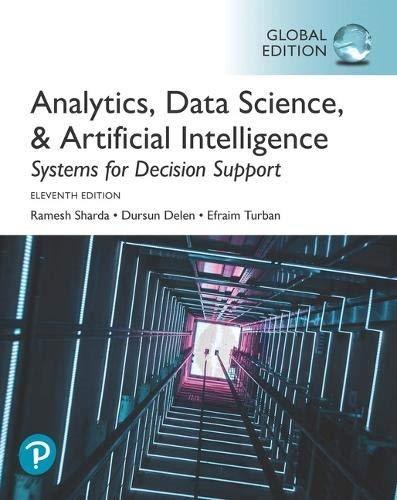On the Internet today, all users have the power to contribute as well as consume information. This
Question:
On the Internet today, all users have the power to contribute as well as consume information. This power is used in many ways. On social network platforms such as Twitter, users are able to post information about their health condition as well as receive help on how best to manage those health conditions. Many users have wondered about the quality of information disseminated on social network platforms. Whereas the ability to author and disseminate health information on Twitter seems valuable to many users who use it to seek support for their disease, the authenticity of such information, especially when it originates from lay individuals, has been in doubt. Many users have asked, "How do I verify and trust information from nonexperts about how to manage a vital issue like my health condition?" What types of users share and discuss what type of information? Do users with a large following discuss and share the same type of information as users with a smaller following? The number of followers of a user relate to the influence of a user. Characteristics of the information are measured in terms of quality and objectivity of the Tweet posted. A team of data scientists set out to explore the relationship between the number of followers a user had and the characteristics of information the user disseminated (Asamoah & Sharda, 2015).
Data was extracted from the Twitter platform using Twitter's API. The data scientists adapted the knowledge-discovery and data management model to manage and analyze this large set of data. The model was optimized for managing and analyzing Big Data derived from a social network platform and included phases for gaining domain knowledge, developing an appropriate Big Data platform, data acquisition and storage, data cleaning, data validation, data analysis, and results and deployment.
Technology Used
The tweets were extracted, managed, and analyzed using Cloudera's distribution of the Apache Hadoop. The Apache Hadoop framework has several subprojects that support different kinds of data management activities. For instance, the Apache Hive subproject supported the reading, writing, and managing of the large tweet data. Data analytics tools such as Gephi were used for social network analysis and R for predictive modeling. They conducted two parallel analyses; social network analysis to understand the influence network on the platform and text mining to understand the content of tweets posted by users. What Was Found? As noted earlier, tweets from both influential and noninfluential users were collected and analyzed.
The results showed that the quality and objectivity of information disseminated by influential users was higher than that disseminated by noninfluential users. They also found that influential users controlled the flow of information in a network and that other users were more likely to follow their opinion on a subject. There was a clear difference between the type of information support provided by influential users versus the others. Influential users discussed more objective information regarding the disease management-things such as diagnoses, medications, and formal therapies. Noninfluential users provided more information about emotional support and alternative ways of coping with such diseases. Thus, a clear difference between influential users and the others was evident. From the nonexperts' perspective, the data scientists portray how healthcare provision can be augmented by helping patients identify and use valuable resources on the Web for managing their disease condition. This work also helps identify how nonexperts can locate and filter healthcare information that may not necessarily be beneficial to the management of their health condition.
Questions for Discussion
1. What was the data scientists’ main concern regarding health information that is disseminated on the Twitter platform?
2. How did the data scientists ensure that nonexpert information disseminated on social media could indeed contain valuable health information?
3. Does it make sense that influential users would share more objective information whereas less influential users could focus more on subjective information? Why?
Step by Step Answer:

Analytics Data Science And Artificial Intelligence Systems For Decision Support
ISBN: 9781292341552
11th Global Edition
Authors: Ramesh Sharda, Dursun Delen, Efraim Turban





